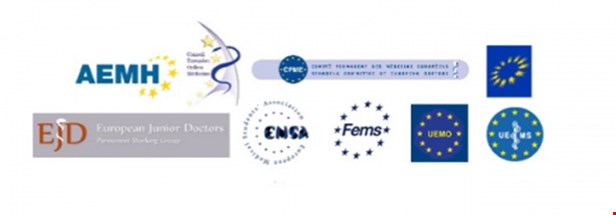“Continuing Professional Development for Doctors - Improving Healthcare”
 © CPME
© CPME
EPF collaborates on an ongoing basis with many healthcare professionals’ organisations on topics such as eHealth, Cross Border Healthcare, Patient Safety and Patient Empowerment. On 18 December, EPF Secretary General participated in the joint conference on ‘Continuing Professional Development for Doctors – Improving Healthcare’ in Luxembourg, organised with the support of the Government of the Grand Duchy of Luxembourg and the Luxembourg Presidency of the Council of the European Union.
Picture: Event co-organisers the AEMH (European Association of Senior Hospital Doctors), CEOM (European Council of Medical Orders), CPME (Standing Committee of European Doctors), EANA (European Working Group of Practitioners and Specialists in Free Practice), EJD (European Junior Doctors), EMSA (European Medical Students Association), FEMS (European Federation of Salaried Doctors), UEMO (European Union of General Practitioners) and UEMS (European Union of Medical Specialists) © CPME
During this meeting, EPF Secretary General Nicola Bedlington stressed our long-term, strong cooperation with CPME embodied in a set of Joint Principles adopted in 2008. EPF’s Youth Group, too, has established a good relationship with the organisation of European Junior Doctors.
From the patient perspective, continuing professional development (CPD) is vital to ensure professionals maintain their knowledge up-to-date throughout their career and continuously improve their skills. It is an ethical obligation for professionals to ensure their professional practice is current.
The revised EU Directive 2005/36/EC on professional qualifications requires Member States to take measures to encourage CPD, but Member States are not obliged to have a CPD system in place or to report publicly on their activities. Indeed, CPD is mandatory for doctors in only 20 of the 31 countries surveyed by CPME in 2015.
EPF believes a CPD system for health professionals should be mandatory for all EU Member States. It should be enforceable and there should be sanctions for non-compliance. Moreover, there is a need for closer collaboration particularly in some key areas, such as clarifying the impact of CPD on patient safety and healthcare outcomes, and developing skills to better support chronic disease management and patient centred care.
EPF sees patients as a valuable resource in health professional education. Our involvement helps professionals understand the expectations and values of patients, develop solutions centred around their needs, and see patients as genuine and valued partners. Integrating the experience of patients can transform the development and delivery of education and training.
The flip side of this is that patients also need “professional development”. Nicola Bedlington presented the European Patients’ Academy on Therapeutic Innovation (EUPATI) as an example of an innovative training model. EPF also has its own capacity building programme including EU level training in areas such as health technology assessment, patient safety and transparency. It facilitates the development of national umbrella patients’ coalitions and holds annual Regional Advocacy Seminars as part of a membership strategy.
Nicola concluded by presenting EPF’s patient empowerment campaign and the different ways in which medical professionals can contribute to it. She stressed, “EPF would welcome the opportunity to work with professionals’ organisations to develop concrete, achievable actions towards integration of the patient perspective in professional training.” Recommendations to this effect will be included in the “Multi-Stakeholder Roadmap for Patient Empowerment”, which will be adopted next year as part of the campaign.
Following the meeting, a consensus statement was reached by the organisers; you can find a copy here.
Contact: Nicola Bedlington, EPF Secretary General, nicola.bedlington@eu-patient.eu
